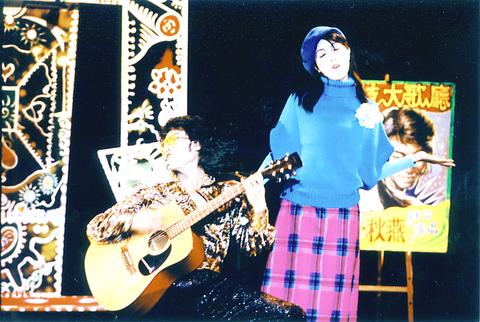S teppinginto a rehearsal for Golden Bough Theater's (
In the past decade since it was founded, Golden Bough Theater has made a name for itself by performing everywhere from formal theaters to small-town night markets throughout Taiwan. Their style is marked by a fusion of modern theater elements with traditional Taiwanese opera. She is So Lovely, the company's twelfth full-fledged production, is no different; a combination of popular Taiwanese songs from the 1930s to the 1970s, melodrama and spoofs of popular television shows and Hong Kong action movies for an hour and a half of comedic cabaret.

PHOTO COURTESY OF THE CKS CULTURAL CENTER
The story, by Yu Hui-fen (游惠芬), is set in a famous Taiwanese nightclub. Chien-li, a street vendor who falls in love with one of the nightclub's singers, begins a life of crime when his sweetheart falls for a rich patron and flies away to America. Two of the club's headline acts, Chi-chiang and Chou-yen, also fall in love, only to be torn apart by jealousy, then reunited. Others involved include a wealthy young lady who falls in love with Chi-chiang, the man who loves her and a band of "Black Hand" killers. Chien-li, for his part, begins killing indiscriminately, but sheds tears of remorse for each of his victims. If it all sounds confusing, it is. But the plot is not what the show is about.
"It's all lighthearted," Wang later said. "We want audiences to be entertained by the show, not be afraid of it."
Wang should know what's entertaining. He's the son of award-winning Taiwanese television actress Hsieh Yue-hsia (
Audiences may also recognize the set design and marquees by Lee Chun-yang (李俊陽), whose renditions of film posters have long adorned building sides in Hsimenting. Lee's design turns the entire house into something reminiscent of a high-school prom, with heart-shaped balloons hanging from the ceiling and huge red streamers running from candy-colored rococo set pieces, adding to the cabaret feel. Equally splendid, Chen Po-wei's (陳柏維) costume design is a study in kitsch with shirts that look like wallpaper and blouses with which you could cover windows.
Watching a rehearsal with actors dressed in street clothes, however, it's easy to see that it is the cast that makes the show enjoyable. Led by Wu Peng-feng (
"The show is really about the music," Wu says, adding that Chinese, Japanese and Western influences all have helped shape Taiwan's musical canon. "The music has great energy and is so diverse -- love songs, folk songs, rock songs -- it's what energizes the show and makes it appealing to a wide audience."
Before sliding back on stage, Wu introduces me to the company manager, Judy Tseng (
She is So Lovely is part of the Chiang Kai-shek Cultural Center's Formosa Experimental Theater Festival and plays tonight and tomorrow night at 7:30pm at the National Experimental Theater. Matinee shows are tomorrow and Sunday at 2:30pm. Tickets cost NT$450 and are available at all Acer ticketing outlets or at the venue. The National Experimental Theater is located at 21-1 Chungshan S. Rd., Taipei (

As Taiwan’s second most populous city, Taichung looms large in the electoral map. Taiwanese political commentators describe it — along with neighboring Changhua County — as Taiwan’s “swing states” (搖擺州), which is a curious direct borrowing from American election terminology. In the early post-Martial Law era, Taichung was referred to as a “desert of democracy” because while the Democratic Progressive Party (DPP) was winning elections in the north and south, Taichung remained staunchly loyal to the Chinese Nationalist Party (KMT). That changed over time, but in both Changhua and Taichung, the DPP still suffers from a “one-term curse,” with the

Jan. 26 to Feb. 1 Nearly 90 years after it was last recorded, the Basay language was taught in a classroom for the first time in September last year. Over the following three months, students learned its sounds along with the customs and folktales of the Ketagalan people, who once spoke it across northern Taiwan. Although each Ketagalan settlement had its own language, Basay functioned as a common trade language. By the late 19th century, it had largely fallen out of daily use as speakers shifted to Hoklo (commonly known as Taiwanese), surviving only in fragments remembered by the elderly. In

William Liu (劉家君) moved to Kaohsiung from Nantou to live with his boyfriend Reg Hong (洪嘉佑). “In Nantou, people do not support gay rights at all and never even talk about it. Living here made me optimistic and made me realize how much I can express myself,” Liu tells the Taipei Times. Hong and his friend Cony Hsieh (謝昀希) are both active in several LGBT groups and organizations in Kaohsiung. They were among the people behind the city’s 16th Pride event in November last year, which gathered over 35,000 people. Along with others, they clearly see Kaohsiung as the nexus of LGBT rights.

In the American west, “it is said, water flows upwards towards money,” wrote Marc Reisner in one of the most compelling books on public policy ever written, Cadillac Desert. As Americans failed to overcome the West’s water scarcity with hard work and private capital, the Federal government came to the rescue. As Reisner describes: “the American West quietly became the first and most durable example of the modern welfare state.” In Taiwan, the money toward which water flows upwards is the high tech industry, particularly the chip powerhouse Taiwan Semiconductor Manufacturing Co (TSMC, 台積電). Typically articles on TSMC’s water demand